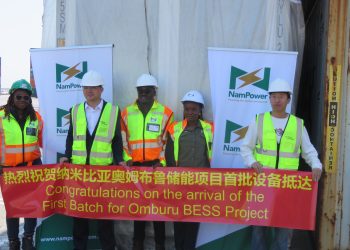
Botswana President Mokgweetsi Masisi says the Botswana Oil Company has initiated discussions with the Namibia National Petroleum Corporation (NAMCOR) to explore potential collaboration on shared fuel storage facilities at Walvis Bay.
He says this collaboration aims to enhance fuel transportation and streamline oil sourcing from Angola.
“Another potential area of collaboration exists in the energy sector, where Botswana Oil Company has initiated discussions with the Namibia National Petroleum Corporation to explore possibilities for cooperation in establishing shared fuel storage facilities at Walvis Bay. Discussions also include joint efforts for fuel transportation and coordinated approaches toward sourcing oil from Angola,” Masisi said.
He said Namibia is also emerging as a key player in oil exploration and green hydrogen development, positioning itself for substantial economic growth.
This potential was highlighted at the Swakopmund International Trade Expo, an event organised by the Namibia Chamber of Commerce and Industry (NCCI), which promotes trade and investment prospects.
“Namibia is emerging as a key hub for oil exploration and green hydrogen development, poised to elevate the country to unprecedented heights of economic prosperity,” Masisi noted, emphasising the importance of events like the Swakopmund International Trade Expo in shedding light on trade and investment opportunities.
As both nations explore these collaborative opportunities, they aim to strengthen their economic ties and enhance regional development.
He said the collaboration extends beyond energy, with both Botswana and Namibia leveraging renowned wildlife safari offerings to boost tourism through joint marketing efforts.
Masisi emphasised the potential benefits, saying: “By engaging in joint marketing efforts, our countries can extract more value. Both nations have ratified significant regional agreements, such as the Southern Africa Development Community Free Trade Protocol and the Tripartite Free Trade Area Agreement”.
He said these agreements aim to boost trade by creating a single market of approximately 700 million people, with an estimated GDP of over US$1.4 trillion.
“Our two countries have both ratified comparable regional agreements… aimed to boost trade,” Masisi highlighted.
The infrastructure potential was also underscored, focusing on modern communication technologies and fibre optic connectivity.
“Another opportunity is the fact that you have several ports, and we, being land-linked, need to communicate with the rest of the world using the most up-to-date technologies,” said Masisi.
A pivotal bilateral project, the Trans-Kalahari rail line, is also under consideration to enhance goods transportation between the two nations and the broader Southern Africa Development Community (SADC) region.
“Governments must uphold the responsibility of fostering trade investment by establishing an environment that enables the private sector to flourish. On a bilateral scale, the Trans-Kalahari rail line stands out as a crucial project that demands robust pursuit to enhance the transportation of goods between our two nations and the broader SADC region,” he said.
The plan to establish oil storage facilities outside the country comes as the planned expansion of domestic strategic reserves has dragged on for several years.
The 171 million litres Tshele Hills storage project, which aims to increase the country’s strategic oil reserves to 60 days of supply, has been in the works since 2010.
This comes as Botswana Oil announced plans to establish fuel storage facilities at Mozambican and Namibian ports which will double the country’s strategic oil reserves and provide a buffer against declining refining capacity in South Africa.
While the country’s existing strategic facilities can carry the national demand for 15 days without additional supply, the facilities due in Mozambique and Namibia would collectively hold 30-day stock.
Botswana consumes approximately 100 million litres of various fuels each month and receives nearly all of its supplies from South Africa.
The government maintains strategic reserves as a buffer for emergencies, which have occurred in the past when supplies from South Africa have been disrupted by strikes and protests along the supply routes.







